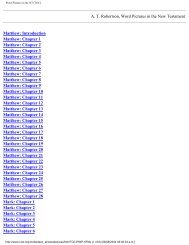Commentary on Joshua - Keil & Delitzsch - David Cox
Commentary on Joshua - Keil & Delitzsch - David Cox
Commentary on Joshua - Keil & Delitzsch - David Cox
You also want an ePaper? Increase the reach of your titles
YUMPU automatically turns print PDFs into web optimized ePapers that Google loves.
<strong>Keil</strong> and <strong>Delitzsch</strong> <str<strong>on</strong>g>Commentary</str<strong>on</strong>g> <strong>on</strong> the Old Testament<br />
cannot imagine the reference to be to the territory of Og of Bashan, which was<br />
formerly inhabited by Amorites, as that did not extend so far north; and the<br />
explanati<strong>on</strong> given by Knobel , that farther north there were not Canaanites, but<br />
Amorites, who were of Semitic origin, rests up<strong>on</strong> hypotheses which cannot be<br />
historically sustained.<br />
Verse 5-7. There still remained to be taken (2) "the land of the Giblites," i.e., the<br />
territory of the populati<strong>on</strong> of Gebal (1 Kings 5:32; Ezek. 27:9 ), the Byblos of the<br />
classics, <strong>on</strong> the Mediterranean Sea, to the north of Beirut, called Jebail by the Arabs,<br />
and according to Edrisi ( ed. Jaubert , i. p. 356), "a pretty town <strong>on</strong> the sea-shore,<br />
enclosed in good walls, and surrounded by vineyards and extensive grounds planted<br />
with fruit trees" (see also Abulfed. Tab. Syr. p. 94). It is still a town with an old wall,<br />
some porti<strong>on</strong>s of which apparently bel<strong>on</strong>g to the time of the Crusades (see<br />
Burckhardt , Syr. p. 296, and Ritter , Erdk. xvii. pp. 60ff.).<br />
(Note: The evidence adduced by Movers (Phönizier, ii. 1, p. 103), that the Giblites did not bel<strong>on</strong>g to the<br />
Canaanites, has more plausibility than truth.) "And all Leban<strong>on</strong> toward the sunrising:" i.e., not<br />
Antilibanus ( Knobel ), but the Leban<strong>on</strong> which is to the east of the territory of Gebal, "from Baal-gad<br />
under Mount Herm<strong>on</strong>," i.e., Paneas Banjas at the foot of Herm<strong>on</strong> (see at Josh 11:17), "unto the entering<br />
in to Hamath,"<br />
i.e., as far up as the territory of the kingdom of Hamath, with the capital of the same name <strong>on</strong> the Or<strong>on</strong>tes<br />
(see at Num 34:8).<br />
Lastly, there still remained (3) "all the inhabitants of the mountains, from Leban<strong>on</strong> to<br />
Misrephothmaim," i.e., the prom<strong>on</strong>tory of Nakura (see at Josh 11:8), namely "all the<br />
Sid<strong>on</strong>ians," i.e., all the Phoenicians who dwelt from Leban<strong>on</strong> southwards, from the<br />
boundary of the territory of Hamath down to the prom<strong>on</strong>tory of Nakura. According to<br />
ancient usage, the Sid<strong>on</strong>ians stand for the Phoenicians generally, as in Homer, <strong>on</strong><br />
account of Sid<strong>on</strong> being the oldest capital of Phoenicia (see Ges. <strong>on</strong> Isa. i. pp. 724ff.).<br />
All these the Lord would root out before Israel, and therefore <strong>Joshua</strong> was to divide<br />
the whole of northern Canaan, which was inhabited by Phoenicians, am<strong>on</strong>g the<br />
Israelites. "<strong>on</strong>ly divide thou it by lot for an inheritance," etc. raq (OT:7535), <strong>on</strong>ly,<br />
i.e., although thou hast not yet taken it. hipiyl (OT:5307), to cause it to fall, here used<br />
with reference to the lot, i.e., to divide by<br />
http://207.44.232.113/~bible/comment/ot/k&d/josh/jos78.html (2 of 3) [13/08/2004 01:18:17 p.m.]
















